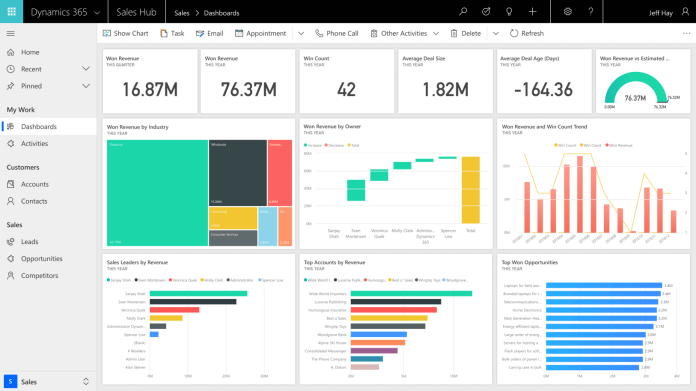Companies that want to be more efficient and competitive in the market must bet on innovative tools capable of optimizing their processes and increasing their business performance. ERP and CRM systems are ideal solutions to reach a new level of business management and increase the competitiveness and productivity of any company.
Using a CRM ( Customer Relationship Management ) and an ERP ( Enterprise Resource Planning ) simultaneously can be a complex task to ensure that both systems can interact and share information efficiently. The best solution would be to use management tools capable of integrating and working with the information. This is the case of Dynamics 365 Business Central ERP and Dynamics 365 Sales CRM from Microsoft, which allow full integration between both platforms.
Benefits of integrating CRM and ERP
CRM tools aim to manage the company’s relationships with its customers to improve them and increase sales and loyalty. For its part, an ERP is a business resource management software responsible for centralized management of all areas of a business, using the automation of processes and tasks.
Both tools share a lot of useful data and information for performing their main functions. The integration of both solutions, as in the case of Business Central and Microsoft Sales, provides a series of advantages and benefits due to the clear focus on the client that is achieved:
Improved decision making
With an integration of the CRM and ERP programs, it will be possible to conduct a better follow-up of the client, consulting related metrics in real time. In this way, much faster and more accurate decisions can be made in business relationships (not having to postpone meetings to close a sale or contract due to a lack of data, for example).
With this integration, for example, data on customer income and expenses will be added to a commercial process, and what all this means for the company. In this way, the sales team will have real-time access to that information and will be able to make better decisions.
Increase the level of customer satisfaction.
A CRM is responsible for showing the most efficient practices in interactions with the company’s customers. Integrating it with an ERP system that provides the appropriate sources and operational applications will make it possible to offer the client a better service.
With the integration of these business management tools, customers will find what they need at all times, knowing the company’s tastes and needs precisely and having the necessary mechanisms and processes to deliver the product or service they demand.
Automation and centralization of information
With the integration of both platforms, automating many processes related to collecting, organizing, and distributing information is possible. All this is centralized to avoid duplicate, outdated, or unconsolidated data.
Information is companies’ most important asset today, so having a complete and integrated system will allow improvements in customer management. In addition, it will offer more accurate information about the market and the competition; consequently, you can get contacts or leads and manage all the external and internal relationships of the business efficiently.
Analytical capabilities are increased by providing the two integrated systems with access to actual financial and operating conditions and accurate and reliable customer reporting.
The different areas of the company will now have access to all the information. Likewise, collaborative work will be easier and more necessary, avoiding teams working in isolation and independently from the rest of the company.
More accurate sales estimates
An ERP and CRM integration provides the sales team with the tools to follow up on contacts and the entire sales process, consulting related metrics and KPIs to understand the customer journey better.
In addition, it will be possible to identify customers with a better conversion rate to establish better relationships with them.
Improve productivity
Integrating both tools will help make all the processes and workflow more agile and efficient, achieving better use of resources (cost reduction) and increasing sales. All this leads to improving business productivity, with a higher return on investment and an increase in the profit margin.
Integrate Business Central with Dynamics 365 for Sales
A few days ago, we talked to you about why you needed more than the commercial management functions of your ERP. On the contrary, in this post, we discussed the advantages of integrating your company’s ERP and CRM.
As you know, Microsoft offers companies two options: if you already have their ERP, it has a CRM module to perform these tasks. However, if you want a more powerful tool, Microsoft recommends Dynamics 365 CRM Sales.
Although an ERP like Business Central and a CRM like Dynamics 365 Sales have different approaches, their goal is the same: to optimize business management to make it more competitive and productive.
These Microsoft tools are fully integrated to work with a management system for all areas of the business. Now it’s time to focus on customer satisfaction.
